P is for Privilege
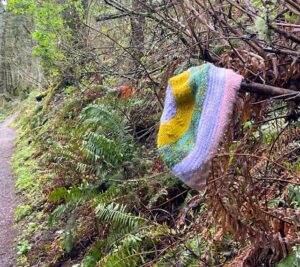
“Woke,” someone recently wrote, is wrong-headed. This was not a MAGA screed. It was an eye-opening criticism of the past tense. Awakening is more like it. This speaks to the truth—and power—of the present participle, the -ing verb form that signals continuity, the ongoing nature of the act. The process.
I am in the process of awakening. It has been hard to awake to the notion of my privilege because growing up female did not imbue me with a sense of privilege. It was/ is about fighting for a place at the table, staying alert to danger, avoiding the male gaze, toeing the line between assertive and bitch. And now, as an old(er) female, whatever privilege I may have somehow gained by “achieving,” by playing by enough of the rules to stay under the radar, that privilege is frail and withered, like our toxic ageist stereotypes.
So, I am awakening, not woke. I am in the (life-long) process of understanding the privilege of my whiteness (thank you, Sterling), the privilege of my heterosexuality (thank you, Shelley), my CIS-genderedness (thank you, Jamie), my “appropriately sized” bodiness (thank you, Roxanne).
This morning, on my (almost daily) hike in the woods, I thought about another kind of privilege: the privilege of geography. This has been written and talked about in important ways: those who live in dangerous places and the privilege of those who inhabit safe(r) environments, those who live in food deserts and the privilege of those with access to healthy food and those. I understand the privilege of geography. I am awake to it on these walks in the woods: spotting the wildflowers, marveling at the profusion of trillia, breathing damp, foggy air, pounding all that needs to be pounded back to Pachamama, the silence, the uncomplicated-by-religion spirituality of it all.
I am overcome with privilege. I am delirious with privilege.

April 26, 2023 1 Comment
There is no me without you
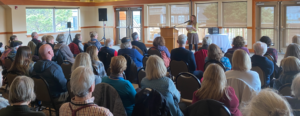
There is no me without you.
There are no writers without readers. There are no writers without booksellers. There are no writers without librarians.
You make what I do possible.
And by “what I do,” I do not mean the act of writing. I make that possible. I mean the ability to reach people with my work.
I know, and have written many times and have told aspiring writers many times, “A real writer is one who really writes.” That’s from a Marge Piercy poem I can recite by heart. What she means is that publication is not what makes a writer a writer. Being a writer is defined by the way you see the world, the way you use writing to figure out that world, what’s important, what makes sense, what you think.
And Piercy may also have been alluding to the “flow state,” that time—minutes, hours if you are lucky—when you (the writer, the artist, the baker, the gardener, the athlete) are so divinely focused on the act of creation that you live outside of time, when all that exists in that moment is the doing. The “justification” for writing is writing.
But then, for me, there is being heard (read). There is hoping what I have discovered, what people have shown and told me, what I have come to understand might resonate, might spark questions and discussion and maybe even action.
And so, for me, readers, booksellers, librarians, arts and letters organizations, and gatherings like the one I was part of this past weekend matter. A lot.
This past weekend I was one of four writers at GetLit at the Beach. No, not a writers’ retreat or a series of workshops. No, not a convention or highly orchestrated bookfest. It was instead a thoughtful, organized but somewhat freewheeling, high-energy three-day event designed for bibliophiles, the brainchild of Terry Brooks. That’s Terry Brooks, the fantasy fiction author with 23 New York Times bestsellers to his name. For the record, he is a self-effacing, down-to-earth, generous man, a sweetheart, actually.
And the event, from the opening reception on one of those glorious blue-sky days at the Oregon coast to the spirited closing panel discussion with rain pelting down (we were inside, of course), was…searching for words here: invigorating, empowering, exciting. Food for the soul. I left feeling proud–not of myself, but of the GetLit folks and Cannon Beach Book Company and the Tolovana Arts Colony and readers, readers, readers.
I am back, ready to work.
And the “me without you” begins with the support, encouragement, passion, perseverance and HARD WORK of Heather Jackson.
April 19, 2023 No Comments
Attention must be paid!
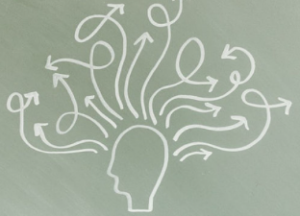
What you are doing right now?
I know one answer: You are reading this essay. Or at least you are reading this sentence that states you are reading this essay.
Did I already lose your attention? In between that sentence and this one, did you:
.Get a buzz on your phone that sidetracked you to a text?
.Get a ping on the laptop that signaled an incoming email that you knew would be garbage, but you had to check it out anyway?
.Have an irresistible urge (meaning you could not resist it, so you did it) to check your Facebook feed?
.And, while scrolling through the heavily curated snippets of other people’s lives, did you find your attention diverted to a reel that took you on a tour of an Emirates first-class cabin? A kitchen hack you will never ever use?
.But was intriguing enough for you to Google it and watch a YouTube?
And then, on your way to the kitchen to brew a cup of tea, you saw out the window, that the cherry tree had popped. So, you had to grab your phone and take a picture. And then, that image was so lovely you just had to post it on your IG account. And as you hashtagged it #springishere, you thought: Shit, spring is here. I need to check out lettuce and broccoli starts at Down to Earth (or whatever your local garden store is). And so, you went to that website.
And now, maybe you are back here, in my literary clutches again. Until I lose you. I mean, wouldn’t it be nice to listen to some music right now? Maybe this? Or perhaps this?
Back again? If I may have your attention for a moment. If we can, in fact, focus our attention for a moment: It is fascinating/ harrowing/ enlightening to focus on how we can’t. Focus, that is. How distracted we are, how easily distracted. How we used to be able to concentrate but find it harder now. How deeply embedded in this non-stop, amped up, constantly accelerating world of information we find ourselves. And how we just have to click over to Zappos right now to see if there’s a big sale on boots because, well, it’s spring. (Yes, I just did that, my friends.)
Here’s a book you may want to read, should read: Stolen Focus: Why You Can’t Pay Attention and How to Think Deeply Again.
And now, go check that email. Because I am sure it is of vital importance. See you next Wednesday.
April 12, 2023 3 Comments
What’s behind the curtain
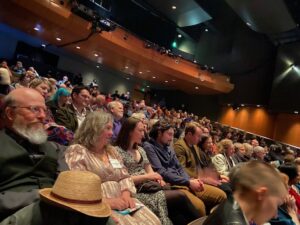
No. I swear to you. This is not more self-promotion about the Oregon Book Award—although the life of the not-already-famous-with-massive-“platform”-writer (that would be me) has been overtaken by, swamped by, self-promotion. I wrote about this for Nieman Storyboard. And struggle with the tension between DOING the work and blabbing about the fact that I have done the work. And angsting about followers and likes and shares and reels and stories and how long I can ignore TikTok and what the New Big Thing will be that will suck up my time.
Instead, I want to pull back the curtain on what, to you all (not you writers reading this…you know the hard truth of this…) may look like “success.” I am talking about the (wonderful, gratifying) Oregon Book Award. Btw, that mention (now twice in two paragraphs) is good seo. For those of you blessed to not know what this is, it stands for Search Engine Optimization, the process of improving the quality and quantity of website traffic to a website or a web page from search engines. So, the more times I mention Oregon Book Award (see how I did that!), the better the chance that this little essay will show up when someone Googles that phrase.
Little man behind the curtain time. My experienced, smart, well connected, caring, and hard-working agent did not have an easy time finding a home for Free. It is not an easy sell. It is not an easy topic. Sure, people OUGHT to care. Sure, there SHOULD be ongoing community and national conversations about how to help people returning home from prison make meaningful lives for themselves. And, yes, the “low-hanging fruit” (criminal justice reformers and activists and the like-minded) may want to read a book like Free. But that, tragically—and I use that word advisedly—is a small group. So, a big publisher with clout and power in the literary marketplace was not going to embrace this book. And did not. It did not help that the previous book was about an even tougher-to-sell subject, life as it is lived by those who’ve been incarcerated for most of their lives.
The paperback. For my entire writing life, the paperback edition of a book follows the hardback by about a year. Standard. Paperback gives the book new life. Often paperback covers are redesigned to give a refresh. Book clubs love paperbacks and often wait for that edition. This publisher has no plans to publish a paperback edition until they sell more hardbacks. But hardbacks have a very limited life. Whatever promotion was done when the book was launched back in May of last year is it. And of course, there is the used book market, which kinda takes over after six months. That’s why paperbacks jump in to reinvigorate. Will the Oregon Book Award (yes, I did it again) make a difference? Who knows. And I don’t have the bandwidth to care as I direct my energies to my next book. What I do know this:
The real writer is one who really writes.
Work is its own cure.
You have to like it better than being loved.
(excerpted from a Marge Piercy poem)
Well, it’s nice to be loved too.
*image (mine) Packed house at Portland Center Stage/ Armory for Oregon Book Awards event April 3, 2023.
April 5, 2023 7 Comments
The voice(s) we listen to

Most nights I go to sleep listening to a mediation I choose from InsightTimer. There are thousands to choose from on this (free) app, including way too many recorded by men with Australian accents (so not restful) and way too many recorded by women with whispery voices (just annoying) and more than a handful that are over-the-top woo-woo (I do not need to visit the Astral plain, thank you very much). But there are also some lovely, thoughtful, deep-breath-inducing reflections that help create the calm space between awake and asleep. I love that space. I may love it more than sleep itself.
Many of the mediations I listen to ask you to think of a sankalpa, the Sanskrit word for intention. (San means “to become one with” and kalpa means “time” and “subconscious mind.”) And no, I didn’t know that. I looked it up. A sankalpa is a way to set intention. It puts into words—a simple declarative sentence—what you need or want or aspire to. But the “secret” is that it is expressed as, essentially, a done deal rather than a “gee, I hope…” statement. So, for example, if a certain person who will remain nameless (well, okay, not so nameless) had a rough, emotionally challenging day and is concerned that she will have trouble clearing her head and falling asleep, the sankalpa would be expressed “I will enjoy a deep and restful sleep” and not “I hope I can get to sleep tonight.”
Consider the difference between those two statements. One is optimistic and empowering. The other already sets you back on your heels and reinforces the difficulties you are imagining.
I have been sankalpa-ing for a while now, but just this morning I put together this practice with what I’ve learned about the “saboteurs”—that cacophony of inner critics who are determined to tell us what we can’t do, what we shouldn’t do, or what we should do that we shouldn’t do. Having a sankalpa allows you to catch those negative thoughts, then work on replacing them with this positive statement.
Believe it not, the sankalpa talks louder than the saboteur.
March 29, 2023 No Comments
What did you say?

If I work hard enough I can control any situation.
I am worthy as long as I am successful
When is the other shoe gonna drop?
No one understands me.
Ah yes, those voices inside our heads. Okay, my head. You too? Maybe not these voices but others? That voice that tells you have to be perfect. That voice that tells you to avoid conflict and therefore mask your feelings. That voice that tells you receiving help means being helpless.
Do not worry, my friends., I have not morphed into a spouter of self-help gobbledegook. I am not about to (gasp) write a book about any of this. The shelves are groaning with books like this.
But I am interested in this take on those sabotaging voices inside our heads by the “positive intelligence” training guru and, yes, best-selling author, Shirzad Chamine, a Stanford lecturer and Fortune 500 corporate coach. By the way, you might consider not buying his book. He does not need your money.
Speaking Fee:
Live Event Fee: $30,000 – $50,000
Virtual Event Fee: $10,000 – $20,000
But you can take his “Saboteur Assessment” test for free—and you might learn something about yourself. Or, like me, nod your head in agreement about what you already know about yourself. Because those (potentially) sabotaging voices are so very familiar.
Can I (we) just stop listening? I doubt it. (Oh no, is that one of my saboteurs talking to me?) I do think that by naming these voices—Charmine identifies 10—we can at least recognize what they are doing, or the dark and unproductive places they “illuminate” for us. And then…Reason with them? Shout them down? Stuff a sock in their mouth?
Here are the nasty little beings making noise inside your (my) head. Tell them to shut the fuck up. (That’s probably not the advice what Shirzad Charmine charges $50,000 for.) Mine is free!
- Judge
- Controller
- Hyper-achiever
- Restless
- Stickler
- Pleaser
- Hyper-vigilant
- Avoider
- Victim
- Hyper-rational
March 22, 2023 6 Comments
The happy writer. Really?

Can we write our way to happiness?
On first blush this question oozes self-indulgence and privilege. More woo-woo bullshit.
On second blush, “can we write our way to happiness?” could be the rhetorical tagline for those enticing writers’ workshops in Tuscany.
But there is actually a body of scientific research on the health and mood benefits of writing and rewriting one’s one narrative. (Google “expressive writing and health” for many citations.) There is significant research on story-crafting and behavior.
We all have a personal narrative that shapes our view of ourselves and the world(s) in which we live. We create that narrative. We construct stories out of experience. We listen to others tell us about ourselves. We learn–even if we don’t think we are learning, even if we don’t want to– what is expected, what is acceptable, and how we fit (do not fit) in. Over time, a grand narrative emerges. And we recite it to ourselves. Over and over. We believe it. We inhabit it. For some, this can be harmful, limiting, even debilitating.
What if we wrote it out this story. Looked at it. And then learned to tell another plausible tale, an alternative narrative, based on the same information.
That’s what researchers at Duke University did with a group of freshmen who (because of bad grades) told themselves they were losers, that they were unfit for college. That was their narrative. These students underwent a “story-changing intervention” during which they got information (and were exposed to inspirational videos) about students who struggled during freshman year but improved as they adjusted to college. The “loser freshman” story could then be recast into an upward trajectory, “this is just all part of growth and adjustment” story. And guess what? Students who had been prompted to change their personal stories improved their grades and were far less likely to drop out than the control group with no intervention.
I thought about the notion of writing one’s way to a more positive self-image, a healing place, an invigorating place, a place of power and self-worth every time I sat with my writing group at Oregon State Penitentiary. They were all serving life sentences for murder. To move beyond debilitating shame and endless guilt, they wrote about the men they were learning to become, the men they had become. They were changing the narrative of their lives.
I think about the woman in my recent university seminar, emotionally brutalized at one of those “bad teen” bootcamps, who is, more than a very tough decade later, writing her way to stability and health. I think about the women in the workshops I am now teaching who use writing as a way to process the pain they have tried so long to ignore.
It is talk therapy when you do the talking. It works.
March 15, 2023 3 Comments
I go to the woods

“It is a serious thing just to be alive on this fresh morning in this broken world.”
— Mary Oliver, Invitation
We all go someplace to work things out: a favorite chair next to a window, the arms of a loved one, the kitchen, the garden, the ocean, some exotic somewhere with frangipani-scented air.
Me? I go to the woods. Or the mountains. Near or far. I go for hard hikes that make me sweat. I pound whatever needs to be pounded into the earth, Mother Earth, Pachamama. You know, the Stuff of Life: grief, hurt, anger, fear. She takes it and remakes it. And almost always this works. I return lighter, sometimes even (if only temporarily) enlightened. I return with this Mary Oliver line in my head.
And also, of course, and predictably, Wendell Berry: “For a time/ I rest in the grace of the world and I am free.”
Today I am tired from a hard day of mountain hiking in the snow at 6,000 feet. It’s the good kind of tired. I am scoured clean of dark thoughts. Of all thoughts. Thus I offer these images I made (as photographers are supposed to say, not “pictures I took”) of places–near and far– that have both challenged me and offered me solace, places where I have felt free and joyful.
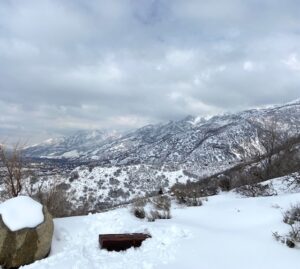
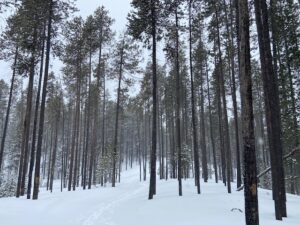

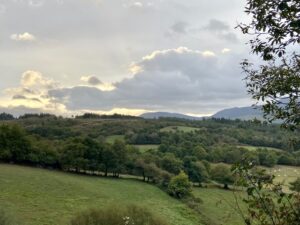
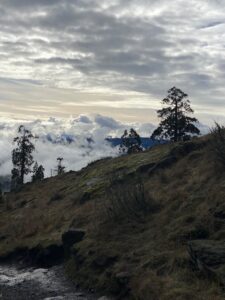
March 8, 2023 4 Comments
Seasons of life. Not.
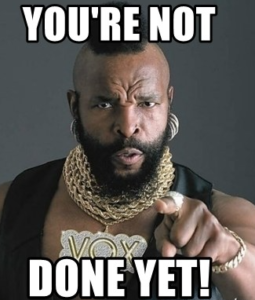
This one isn’t about the Camino.
Or maybe it is. Ever since I returned from that 36-day trek across northern Spain, it seems that everything, somehow, is tied to that experience, from my restlessness when a day goes by without a hard hike to my obsession with pimientos de padron, from my habit of waking before dawn to the vitality I feel as I explore a new relationship.
“I’m not done yet” is what I said to myself—and out loud—when I returned. Treading water is comfortable when the water is warm, and you have learned to tread like a champ. And when it’s been so long since you’ve cast out into deeper waters that you have forgotten the thrill and joy of that. Processing—loss, tragedy, grief, the everyday cruelties–is important and necessary work, and it takes time. But like a blender left churning for too long, one can over-process. Life shouldn’t be smooth and creamy. You should be able to taste it all, each flavor, each texture, distinct. Even the bitterness. Even the chunks.
And so you (and by you, I mean I) say “I’m not done yet” and you move back into the world. You stride, in fact. Which brings me to the point of this little essay, a controlled rant against the “seasons of life” premise.
You know how it goes: Spring is youth, hope, new beginnings. Summer is growth and abundance. Fall is taking stock, slowing down, beginning to feel the chill. Winter is bleak, all sadness, heartbreak, loneliness. We buy into this as the expected phases of our lives. Our culture buys into this in a big way–an appallingly ageist and ignorant way–that hurts the young and the old and the in-between.
Our own experience often contradicts these clichéd seasons: A troubled youth that is anything but hopeful. A summer of “abundance” (careers, acquisitions) that costs us dearly. And an autumn that is so full of hope it takes our breath away. Speaking for myself, it is fall. I am supposed to be in the Autumn of My life. I am supposed to measure my steps, temper my ambitions. I am supposed to feel a chill in the air.
To which I say: NOPE. I am not treading water. I am not moving cautiously. I AM NOT DONE YET.
And don’t get me started on winter. It is the season of boots and soup and snowshoes. The season where strong, graceful, leafless trees reveal their true beauty. Bring it on. Just not yet.
About Mr. T. My favorite character on the A Team. Yes, I watched that show. Also the name of my ferocious rooster who protected the hens from raccoons when he wasn’t otherwise engaged mounting them.
March 1, 2023 2 Comments
The day before

It was the day before The Day, “the day” being my arrival in Santiago de Compostela. I had been on the road—the dirt path mostly, the rocky trail sometimes, the paved road occasionally—since September 23. It was now October 25.
I could barely remember not being on the Camino, not waking before dawn and walking, my back to the sunrise, into the dark western horizon. Tomorrow it would come to an end. I was relieved. I wanted to sleep in a big bed in a room all by myself. I wanted to wear a pair of pants I had not worn every day for more than a month. I wanted to eat an enormous salad.
But I was also saddened. Tomorrow this tough but sublimely uncomplicated life, this single-focused, time-out-of-time, would end.
I had learned, I had delighted in, the fact that the monotony of the Camino was interrupted by surprises every single day. Some surprises were small, like coming upon the extravagantly feathered pheasants in the courtyard of little restaurant in Hospital de Orbigo. Some were big surprises, like today, the day before The Day.
Kiki and I had decided to walk all the way to Lavacolla, a very long day, because that would mean a short walk into Santiago the next morning. Morning was magic time. I wanted that for the arrival. Lavacolla, said Kiki (who knew everything—both her strength and her weakness), was where pilgrims of old stopped to cleanse themselves before entering the holiness of Santiago. Lavacolla could be translated as washing the colon. Or rectum. Or so she said.
We walked. Oh lordy, did we walk. The weather was unforgiving. Sheeting rain. Poncho–drenching rain. We arrived at the village in the late afternoon, soaked and starving, only to discover that the accommodation we had so carefully booked was not, in fact, located in the village of Lavacolla. We would need to walk another—really, I no longer remember—4, 5 kilometers. Uphill. Did I mention the rain?
When we finally crested the last hill and neared where the place supposedly was, it was dark. We saw nothing. No lights. No streets. No settlement. We were drenched. Am I belaboring the point? Perhaps. We finally happened upon the place, hidden down a dark path, unpromising, and presented our pitiful selves to the innkeeper.
The room was warm. The shower was hot. Miraculously, the hostel had a lovely restaurant, which Kiki later quite correctly called “needlessly amazing.” We splurged, ordering a huge pan of paella to share. And we bravely asked if the kitchen could make us pimientos de padrón for a starter (a dish both of us loved with a passion not normally associated with food). Yes, said our needlessly handsome waiter. We washed it all down with two glasses of very good vino tinto.
It was by far the best meal of the entire journey.
February 22, 2023 No Comments





